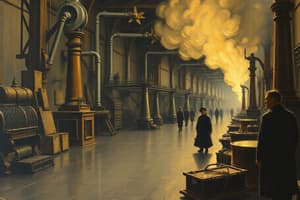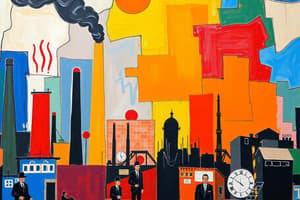Podcast
Questions and Answers
What did the domestic system rely on?
What did the domestic system rely on?
- Trading finished goods in distant markets
- Government control and regulation
- Craftspeople and artisans at home using simple tools (correct)
- Production of goods in large factories
Under which system did merchants supply raw materials to artisans?
Under which system did merchants supply raw materials to artisans?
- Putting out system (correct)
- Domestic system
- Enclosure system
- Factory system
Which invention enabled one person to spin eight threads simultaneously?
Which invention enabled one person to spin eight threads simultaneously?
- Spinning mule
- Spinning Jenny (correct)
- Spinning wheel
- Cotton gin
What does urbanization refer to?
What does urbanization refer to?
Who controls industries in a capitalist system?
Who controls industries in a capitalist system?
What is colonialism?
What is colonialism?
What does socialism advocate for regarding the country's wealth?
What does socialism advocate for regarding the country's wealth?
Who did the wealthy landlords buy land from in the concept of enclosures?
Who did the wealthy landlords buy land from in the concept of enclosures?
What is the primary objective of trade unions?
What is the primary objective of trade unions?
Study Notes
Economic Systems
- Domestic System: Craftspeople and artisans produced goods at home with family members using simple tools.
- Putting Out System: Merchants supplied raw materials to artisans, who produced goods, and then sold the finished products in distant markets.
Industrial Revolution
- Factory System: Goods were produced on a large scale in factories using machines instead of simple tools.
Agriculture
- Enclosures: Large farm fields were enclosed by fences or hedges, leading to wealthy landlords buying and enclosing land from poorer village farmers.
Inventions
- Spinning Jenny: A spinning machine invented by James Hargreaves that enabled one person to spin eight threads simultaneously.
Urban Development
- Urbanization: The growth of towns and cities.
Economic Theories
- Capitalism: An economic system where industry and business are controlled and run for profit by private owners rather than by the government.
- Socialism: An economic system based on the belief that everyone has an equal right to a share of the country's wealth and that the government should control the main industries.
Labor Organizations
- Trade Union: An organization of workers in a particular industry that exists to protect their interests, improve working conditions, etc.
Imperialism
- Colonialism: A policy where one nation acquires control over another country, with the conquered country becoming a colony of the conquering nation.
Studying That Suits You
Use AI to generate personalized quizzes and flashcards to suit your learning preferences.
Description
This quiz covers different economic systems such as Domestic, Putting Out, and Factory systems, as well as the concept of Enclosures in agriculture.




